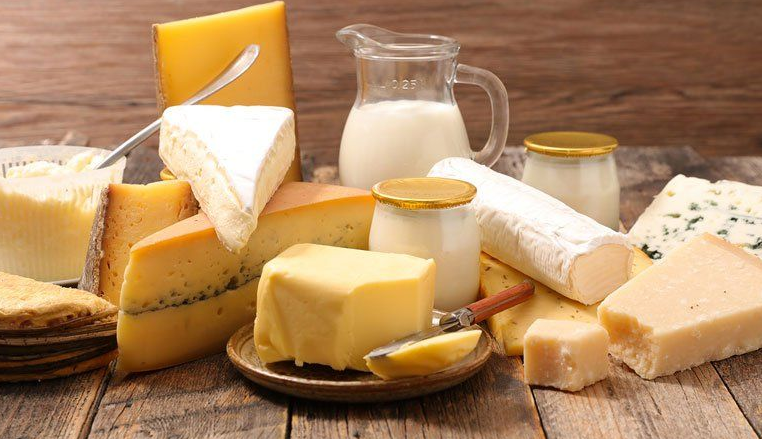Cheese has long been a familiar and attractive dish because of its delicious taste and outstanding nutritional value. However, few people pay attention to the amount of calories in cheese and whether eating cheese makes you fat or not. Let’s explore in detail how many calories are in cheese and the instructions for eating cheese properly for each age through the article below.
Cheese is an attractive and nutritious dish, loved by all ages thanks to its delicious taste and variety in processing methods. Using cheese properly according to age not only optimizes nutritional value but also helps maintain overall health for the whole family. You should pay attention to the appropriate portion and processing method to make the best use of the benefits of this food.
How many calories are in cheese? Learn about the nutritional value of cheese
Cheese is a popular food source, providing many nutrients but also containing significant fat, cholesterol, especially saturated fat. The amount of calories and nutritional composition in cheese varies depending on the type.
Specifically, how many calories are in cheese? According to the United States Department of Agriculture (USDA), 100g of cheese contains about 402.5 calories but this calorie level will vary between types of cheese. For example, 15g of Laughing Cow cheese provides about 67 calories, while 100g of mozzarella cheese contains only about 280 calories.

How many calories are in cheese? 100g of cheese contains about 402.5 calories
Despite its fat and cholesterol content, cheese has its upsides as an excellent source of protein and calcium. Just 60 grams of nonfat cheese provides 40 to 50 percent of your daily calcium needs and about 15 grams of protein, with 160 to 180 calories. In contrast, 60 grams of regular cheese provides the same amount of calcium and protein but is more energy-dense, with about 228 calories, 19 grams of fat (including 12 grams of saturated fat), and 50 to 60 mg of cholesterol.
Although cheese ranks second to meat in providing Americans with saturated fat and cholesterol, it is still an important part of the diet due to its high nutritional value. So when consuming cheese, consider choosing a low-fat variety to maximize health benefits without increasing your calorie or fat intake.
Benefits of cheese for the human body
Cheese is not only a delicious dish but also brings many outstanding health benefits thanks to its high nutritional value. Below are the outstanding benefits of cheese for the body:
Providing protein instead of meat
Cheese contains the same amount of protein as meat, making it a great alternative source in the diet. Consuming cheese properly helps increase muscle mass and supports the digestive system to work more effectively. This is especially useful for those who want to reduce the amount of meat they consume.
Supplementing abundant calcium and minerals
Cheese is rich in calcium, with a content 6 times higher than milk, along with essential nutrients such as vitamin D, folic acid and phosphorus. These ingredients help improve bone health, supporting the overall development of the body. In addition, the abundant minerals in cheese also help maintain stable brain and cardiovascular function.
Good for oral health
Not only bones, the calcium in cheese is also very good for teeth. Eating cheese regularly provides essential minerals, helps strengthen teeth and reduces the risk of tooth decay.

Eating cheese regularly and properly will help strengthen teeth and reduce the risk of tooth decay.
Stabilize blood pressure, balance cholesterol
Cheese contains beneficial bacteria such as propionic and lactic, which help prevent the risk of high blood pressure and help balance cholesterol levels in the body, contributing to improving cardiovascular health.
Antioxidants and providing natural fats
Cheese is rich in selenium, a powerful antioxidant, which helps strengthen the immune system and prevent aging. In addition, omega-3 and protein in cheese also help reduce energy absorption, while providing natural fats that are beneficial to the body.
With the above outstanding benefits, cheese is the perfect nutritional choice to add to your daily diet. However, use it properly and in balance to optimize the health benefits that this food brings.
Is eating cheese fattening?
Cheese is a nutritious food. In addition to wondering how many calories are in cheese, many people ask the question “Does eating cheese make you fat?”, especially those who are interested in maintaining their weight. This mainly comes from concerns about the amount of saturated fat in cheese.
Calorie Count from Cheese
In fact, cheese does not cause weight gain if you consume it properly. For every 15g of fat-free cheese, there are only about 39 calories, which is quite low in energy. Therefore, if used properly, cheese not only does not cause weight gain but also provides protein and calcium, supporting the necessary activities of the body.

Cheese will not make you fat if you consume it properly.
When can eating cheese cause weight gain?
However, eating cheese can cause weight gain if the following factors occur at the same time:
Consuming too much cheese
The large amount of fat and calories in cheese will accumulate, leading to excess energy.
A diet that exceeds daily calorie needs
The total amount of calories from cheese and other foods exceeds the amount of calories the body consumes, causing weight gain.
The body retains water
This increases the feeling of heaviness, affecting overall weight.
Thus, whether eating cheese makes you fat or not depends entirely on how you consume it. With a reasonable dose and a scientific diet, cheese not only does not cause fat but also supports your health and weight loss process.
Guide to eating cheese properly for each age
Cheese is a rich source of nutrients, but to optimize the benefits and avoid side effects, it is very important to use it properly for each age. Here are detailed instructions for you and your family to use cheese safely and effectively.
For children
Children from 6 months of age and older can start to get acquainted with cheese. This is the stage when the baby’s digestive system is developing and cheese provides calcium and protein necessary to support strong bones and teeth. You can combine cheese into porridge, baby food or smoothies to increase nutrition for your baby. However, the amount of cheese should only be limited to about 15g/day to avoid putting pressure on the immature digestive system.

Children from 6 months of age and older can start getting used to cheese.
For pregnant women
Cheese is an excellent source of calcium for pregnancy, supporting the development of the fetus’s bones and teeth. However, pregnant women should only eat about 30g/day and a maximum of 2 times/week to avoid indigestion or increased pressure on the stomach. Choosing sterilized cheese is also very important to ensure food safety throughout pregnancy.
For the elderly
Elderly people often have weaker digestive systems and are prone to health problems such as fatty liver or being overweight. Therefore, they should only use 5 – 10g of cheese per day, prioritizing low-fat and low-salt types to reduce the risk of affecting overall health. Using cheese in the right amount helps supplement calcium, support bone health without causing harm.
People who should not eat cheese
Cheese is a nutritious dish and is loved by many people from children to adults. However, not everyone is suitable to use this food.
Below are groups of people who should limit or avoid eating cheese to protect their health:
Children under 1 year old
The digestive system of children under 1 year old is still weak and not capable of processing cheese. Consuming cheese early can cause allergies or digestive disorders.
People with milk allergies
People who are allergic to milk or ingredients such as lactose, casein in cheese should avoid using it to avoid symptoms such as rashes, difficulty breathing or digestive disorders.
People with poor digestive systems
Cheese contains high levels of fat and protein, which can cause indigestion for people with weak digestive systems or intestinal diseases.
People with diabetes
Cheese is high in calories and saturated fat, not suitable for people with diabetes because it can easily increase blood sugar or make the condition worse.

Cheese is high in calories and saturated fat, which is not good for people with diabetes.
People with a history of cardiovascular disease and high blood pressure
Because cheese contains a lot of cholesterol and sodium, excessive consumption can cause high blood pressure and affect cardiovascular health.
Although cheese is a nutritious food, its use should be appropriate to each person’s health condition. The above groups of people should limit or consult a doctor before using it to ensure safety and nutritional effectiveness.
Hopefully the information in this article has helped you answer the question of how many calories are in cheese and whether eating a lot of cheese makes you fat. Cheese is a rich source of nutrition, suitable for many ages if used properly and in the right dosage. Although it contains a certain amount of calories, whether eating cheese makes you fat or not depends on how you balance your diet.





